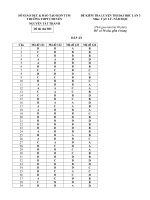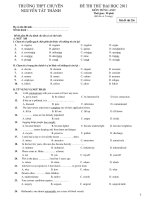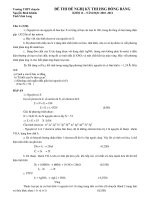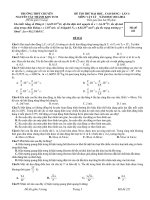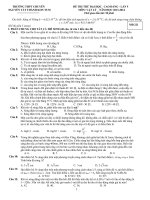KỲ THI CHỌN HỌC SINH GIỎI CẤP TRƯỜNG NĂM HỌC 2011 - TRƯỜNG THPT CHUYÊN NGUYỄN TẤT THÀNH pdf
Bạn đang xem bản rút gọn của tài liệu. Xem và tải ngay bản đầy đủ của tài liệu tại đây (182.07 KB, 11 trang )
Môn thi : Tiếng Anh
Thời gian thi : 180 phút ( không kể thời gian giao đề)
Ngày thi : 3/11/2008
Đề thi gồm có 9 trang
Điểm của bài thi Họ, tên và chữ kí của giám khảo
Số phách
(do chủ tịch HĐCT ghi)
Bằng số: Giám khảo 1:
Bằng chữ: Giám khảo 2:
PART I : LISTENING
Question I: You are going to hear an interview on transportation. As you listen, fill in the
form below with no more than three words or numbers:
Questions
Names
How do you
get to school ?
How far is it
from your
home to
school ?
How long
does it take
you to get to
school ?
Are you ever
late because
of transporta-
tion problems
?
Suggestions
for improving
the transpor-
station ?
Mike By bus 3. 5. 7. 9.
Liz 1. 4. It depends No 10.
Tom 2. A few blocks 6. 8.
Question II: You are going to hear an interview on booking a holiday. Listen and tick()
whether the statements are True(T), False(F) or Not Given(NI):
STATEMENTS T F NI
1. They want to book a holiday for July.
2. They have decided where to go for the holiday.
3. Both customers are free to travel in the first week.
4. Last year, both of them visited France.
5. They would like to go to the mountains for skiing this year.
6. They don't want to go to Italy because the dates don't suit them.
7. They don't like to go to Sweden because there are no beaches.
8. It would be 385 pounds for them to visit Portugal
9. The customers prefer to visit Portugal by flight from London.
10. The flight stops at Manchester on the way to Portugal.
TRƯỜNG THPT CHUYấN
NGUYỄN TẤT THÀNH
ĐỀ CHÍNH THỨC
KỲ THI CHỌN HỌC SINH GIỎI CẤP TRƯỜNG
NĂM HỌC 2010 - 2011
PART II : LEXICO - GRAMMAR:
Question I: Choose the word or phrase which best completes each sentence. Circle the
letter A, B, C or D next to the correct word or phrase.
1. We don't allow in the classrooms.
A. people smoke B. smoke C. people to smoke D. to smoking
2. What a dangerous thing to do! You have been killed!
A. may B. can ` C. must D. might
3. By the time I applied, all the holiday vouchers used up.
A. had been B. have been C. were D. are
4. I felt as if I a confidence.
A. have betrayed B. would betray C. had betrayed D. am betraying
5. The candidate to have withdrawn her application.
A. claimed B. said C. denied D. reported
6. How could you have him for your brother?
A. confused B. considered C. thought D. mistaken
7. It is vital that we a change in people's attitudes.
A. bring down B. bring back C. bring about D. look after
8. We'll have to down the options before coming to a decision.
A. slow B. narrow C. bring D. wind
9. The grocer's shop since the supermarket opened.
A. closed B. has closed C. has been closing D. is closed
10. In ten year's time the population of the world to 500 million.
A. grows B. is growing C. has grown D. will have grown
11. According to the rules of this contest, all employees and their immediate family member are
not fit to be chosen to enter the contest.
A. preferable B. qualified C. eligible D. desirable
12. When Sarah walked into the room and greeted everyone with a cheery “ hello” , it seemed as
if all the gloom in that place was driven out.
A. expelled B. ejected C. banished D. removed
13. When we heard the unexpected news, we were at a loss for words.
A. could not speak for a while B. did not know what to say
C. became dumb D. panicked
14. “ Mum, could you please help me with my homework?”
“ Could you ask your father? I have my hands full at the moment.”
A. am very busy B. am very tired
C. have to go out D. have a lot on my mind
15. “ Who can tell me what man is? Is he a carnivore or a plant-eating animal or both?” The
science teacher asked the class.
A. omnivore B. predator C. herbivore D. equator
Your answers:
1……… 2…………. 3………… 4………… 5……………
6……… 7…………. 8………… 9………… 10…………
11……… 12………… 13………. 14………. 15…………
Question II : Give the correct tense and form of the verb to fit each gap.
1. It was essential that the union (1.moderate)……………its demand for a shorter working week.
2. Were I (2. know)…………… the answer, I would tell you right away.
3. It was our fault to keep Mary waiting so long. We (3.inform)……………her in advance.
4. For the past few days, I (4.work)……………in Jack's office, as my own office
( 5. redecorate)………….
5. I wish I (6.know)……………you needed the book. I (7.buy)……………it for you in London.
6. Too big and too heavy (8.pull)………… behind passenger cars, these mobile homes are
moved by tow trucks.
7. The Amazon valley is extremely important to the ecology of the earth. Forty percent of the
world's oxygen ( 9. produce)…………. there.
8. I was such a beautiful child that my parents used to have me (10. kidnap)……… just to see
my picture in the newspapers.
Your answers:
1……… 2…………. 3………… 4………… 5……………
6……… 7…………. 8………… 9………… 10…………
Question III : Read the passage and fill in each blank with the correct form of the word
provided
Modern advertisements contain hidden messages. (1) IMPLY in the advertisements
showing the pretty girl in the new car or the smiling children round the packet of washing
powder is the message that if we buy the (2) PRODUCE , we also achieve success and
happiness. It is a subtle approach since it seeks to exploit our secret teams, and it is (3) ESCAPE
since advertising is ubiquitous, giant street hoardings and (4) CATCH jingles on TV bombard us
form all sides. They brainwash us into believing that we can realize our ambition quickly and (5)
EASE .On the other hand, defenders of advertising say that it is (6) BENEFIT. Advertising is
(7) INFORM Advertisements tell us about useful new products. They (8) BRIGHT our lives
with colour and music. They increase demand, stimulate industry and so keep prices down.
Whether for or against advertising, most people would agree that some kind of watch-dog body,
(9) APPOINTMENT by government or by the advertising industry itself, necessary to maintain
standards or honesty and to discourage the more blatant types of (10) LEAD advertisements.
Your answers:
1……… 2…………. 3………… 4………… 5……………
6……… 7…………. 8………… 9………… 10…………
Question IV : There are ten mistakes in the following passage. Underline the mistakes,
number and correct them.
Priscilla Presley, actress and widower of Elvis Presley, entered the acting profession quiet
accidentally. On being asked to do a television commerce for a well-known shampoo, she took
which turned out to be an important decision: to take actor classes.
She did this in an attempt to overcome her acute shyness at being in the public eye, but to
her amazement she loved every minutes. Her extreme lack of confidence stemmed from the early
days of her marriage with Elvis, which she remembers were often spent sitting in dark, depressed
hotel rooms away from the glare of publicity, who Elvis was so anxious to avoid.
Film work, including the high successful slapstick comedy The naked Gun, quickly
followed the television contract.
Your answers:
1……… 2…………. 3………… 4………… 5……………
6……… 7…………. 8………… 9………… 10…………
Question V: Read the following passage and use ONE word to fill in each gap.
The Great (1)………………of Giza was built as a (2)……… of Pharaoh Cheops in
2720 BC. (3)…………… it was built a long time ago, its (4)………………….makes it one of
the true (5)………… of the world. The four (6)…………….of the pyramid are put almost
exactly on true north, south, east and west.
Explorations and detailed examinations of the base of the structure reveal many
interesting lines. Further (7)……… study indicates that (8)………… represent a type of line of
events-past, present and future. Many of the (9)………….have been interpreted and found to
coincide with known facts of the past.
Was this super structure made by ordinary beings or one built by a race
(10)…………superior to any known today?
Your answers:
1……… 2…………. 3………… 4………… 5……………
6……… 7…………. 8………… 9………… 10…………
PART III : READING.
Question I . Read the passage carefully and then choose the best answer to each sentence.
Hundreds of thousands of persons each year fall prey to some type of cancer, but new
methods of radiation therapy have enabled doctors to save more lives than ever before. Medical
researchers have developed several experimental forms of this time –honored cancer treatment
that seem effective in fighting the disease.
One promising approach involves exposing cancer cells to radiation by implanting a
radioactive source directly into the malignant tissue. This process greatly increases the dosage
and thus the effectiveness of the treatment. Another technique utilizes drugs to make cancer cells
more susceptible to the effects of radiation and to make normal cells more resistant. Certain
drugs are able to neutralize the genetic framework of cancer cells, thus making them more easily
affected by radiation. Both techniques have seen some positive results in the treatment of
inoperable brain tumors.
These and other methods have helped to raised the recovery rate for cancer victims from
30 percent 40 years ago to around 50 percent today. This is encouraging news for those who fall
prey to one of the world’s leading killers.
1. What is the author’s main purpose in the passage ?
A. To provide statistical information on cancer.
B. To argue for new methods of cancer treatment.
C. To illustrate new techniques of radiation therapy.
D. To give the results of recent cancer research.
2. According to the passage, which of the following is true about radiation therapy?
A. There is only one effective form of this therapy.
B. It saves millions of lives each year.
C. It is an accepted method of cancer treatment.
D. It causes the incidence of cancer to raise dramatically.
3. In paragraph 2, the word “ malignant ” most closely means :
A. diseased B. experimental C. treated D. porous
4. According to the passage, radiation therapy is most effective when :
A. Drugs are used to relax the cancer patient.
B . The cancer is directly exposed to the radioactive material.
C. It is used on as many patients as possible.
D. The cancer cells are resistant to treatment.
5. It can be inferred from the passage that :
A. Improvements in cancer treatment during the last half century have been relatively
ineffective.
B. The number of deaths caused by cancer has decreased substantially.
C. Fewer people are susceptible to the effects of cancer.
D. Scientists are close to eliminating cancer entirely.
Your answers:
1……… 2…………. 3………… 4………… 5……………
Question II. For question from 1 – 5, read the following text carefully and then choose
from the list A- I the best phrase given below to fill each of the spaces. Each correct phrase
may only be used once. Some of the suggested answers do not fit at all. The exercise begins
with an example ( 0 ).
MODERN ENGLISH
Imperceptibly, during the 18
th
century, English loses the most noticeable remaining features of
structural difference ( 0 ) I By the end of that century, with but a few exceptions, the
spelling, punctuation, and grammar are very close to ( 1 ) If we take an essay by
William Hazlett ( 1775 – 1830 ) or a novel of Jane Austen ( 1775 – 1817 ), for example, we can
read for pages ( 2 ) We would find the vocabulary somewhat unfamiliar in places, the
idiom occasionally unusual or old-fashioned, the style elegant or quaint, and we might feel that
the language was in some indefinable way characteristic of a previous age : but we do not need
to consult a special edition or historical dictionary at every turn ( 3 ) Jane Austen makes
demands on our modern linguistic intuitions which seem little different from those required by
Catherine Cookson or PD James.
However, despite this apparent continuity, the language at the end of the 18
th
century is
by no means identical to what we find today. Many words, though spelt the same, had a different
meaning.
( 4 ) we would also notice several differences in pronunciation, especially in the way
words were stressed. And an uninformed modern intuition would achieve only a superficial
reading of literary texts of the period. In reading a novel of the 1990s, we can make an
immediate linguistic response to the social and stylistic nuances introduced into the text, ( 5
) we recognise the differences between formality and informality, or educated and
uneducated; we can sense when someone is being jocular, ironic, risqué, archaic or insincere. We
can easily miss such nuances in the writing of the early 19
th
century, especially in those works
which take the manners of contemporary society as their subject. That world is more
linguistically removed from us than at first it may appear.
A. in order to understand the text.
B. that deceive in its apparent continuity.
C. because the context often enables us to see the intended sense.
D. what they are today
E. because we are part of its age
F. when we know it had an additional meaning at that time
G. if we had tape recordings of the time
H. before a point of linguistic difference might make us pause
I. which distance the Early Modern English period from us
Your answers:
1……… 2…………. 3………… 4………… 5……………
Question III. Read the following text and decide which word best fits each blank.
OSCAR’S WINNING PERFORMANCE
Two boats, engines paralysed are drifting helplessly towards rocks in a raging sea. Gale-
force winds are blowing as a distress message is relayed to the (1 ) The west coast
search – and- rescue helicopter takes off from Shannon; its destination is Clew Bay in County
Mayo.
The terrified crews on Sundancer and Healther Berry are only half a mile from disaster
when Hotel Oscar, the Irish Marine Emergency Service helicopter arrives and the winch crew
( 2 ) saving their lives. There is no hope for the boats – the conditions are too bad for that.
The threatening rocks will make matchwood of them.
It’s not easy to get the rescue line down on the pitching, rolling decks as the pilot,
Captain Al Lockey hovers directly ( 3 ) By the time the exhausted winchman has picked
up the two crew members of Healther Berry , the helicopter is running ( 4 ) on
fuel. The pair on Sundancer will have to be abandoned if ( 5 ) else is to survive. As
if that decision isn’t difficult enough, screaming winds make for a treacherous flight out of the
bay.
For Captain Locky, 25 years a helicopter pilot and veteran of typhoon conditions off oil
rigs in the South China Sea, this was the worst experience in a distinguished ( 6 ) In
fact, a change in wind direction was to spare. Sundancer its horrible face, much to the ( 7
) of the rescue crew whose hearts were breaking as they were forced to turn their backs
and ( 8 ) for home. Medals, it is said should be given to those who have to make that most
painful decision to say “ no ”. Fortunately, most crews can and (9 ) say “ yes ” in all
conditions and at all
( 10 ) of night and day.
That was Mission 47, accomplished just over three months after Hotel Oscar’s contract
began in July 1991.
1. A. shore B. land C. beach D. seaside
2. A. set off B. set up C. set out D. set about
3. A. above B. higher C. ahead D. over.
` 4. A. low B. clown C. short D. out
5. A. no one B. everyone C. someone D. all
6. A. job B. role C. profession D. career
7. A. satisfaction B. comfort C. relief D. gratitude
8. A. go B. fly C. head D. lend
9. A. should B. do C. may D. need
10. A. periods B. moments C. hours D. minutes
Your answers:
1……… 2…………. 3………… 4………… 5……………
6……… 7…………. 8………… 9……… 10…………
D. WRITING
Question I : Rewrite these sentences so that the new one has a similar meaning as the
sentence preceded:
1. He did not pass his driving test until he was nearly 30 years old.
It
2. He is determined to campaign for his son’s freedom.
He has no
3. Stock brokers bought the company shares because they assumed that it was making a lot
of profit.
Had
4. The financial crisis affects both developed and third-world countries.
Not only
Restaurant and hotel prices
146
261
232
375
225
307
219
318
236
382
10
25
52
23 22
31
44
22
10
72
0
50
100
150
200
250
300
350
400
Budapest Frankurt Hong
Kong
London Madrid Milan New York Paris Prague Tokyo
$ Hotel $ Restaurant
5. He was very sorry because he didn’t have time to visit all places of interest in London
when he was there last year.
He greatly
Question II: Do not change the given word, use it to rewrite each of the following
sentences so that each has as a similar meaning as the original one.
1. Although he had his legs cut off after a serious accident, he competed in the Olympic Games
and won a medal. (Prevent)
2. They suddenly realized that they were on the verge of a bankrupt. (Dawned)
3. The rocketing prices have proved too much for most salaried people. (Cope)
4. We must accept the fact that we haven't made much progress in the struggle against poverty.
(Terms)
5. Illiteracy has been one of the causes of poverty.( Contributed)
Question III: Chart description:
The bar chart compares the prices of hotels and restaurants in 10 big cities in the world.
Write a report, describing the information shown below.
You should write at least 150 words.
N.B. Price of a double room with bath, incl. breakfast and service, in a 1
st
class international
hotel.
Price of a dinner for one (rib or sirloin steak with two side dishes and a dessert; without drinks),
incl. service, in a good restaurant.
Question IV: Essay writing:
It is very important that children should study hard at school. Time spent playing sports and
having fun is time wasted. Do you agree?
Use your own ideas, knowledge and experience and support your arguments with examples and
relevant evidence.
You should write at least 250 words.
ANSWER KEY
Part I : LISTENING (3)
Question I: (10 x 0.1)
1. by car 2. by bike 3. 5 miles 4. 20 miles 5. 15-20 minutes
6. 15 minutes 7. Yes 8. No 9. Need more buses 10. Better subway system
Question II : (10 x 0.2 )
1. T 2. F 3. F 4.T 5. NI
6. T 7. NI 8. T 9. F 10. NI
PART II : LEXICO - GRAMMAR: (6.5)
Question I(15 x 0.1 )
1.C 2.D 3.A 4.C 5.A
6.D 7.C 8.B 9.B 10.D
11.B 12.D 13.B 14.A 15.C
Question II: (10 x 0.2 )
1. moderate/ should moderate 2. to know 3. should have informed
4. have been working 5. is being redecorated 6. had known
7. could/ would have bought 8. to be pulled 9. is produced
10. kidnapped
Question III: (10 x 0.1 )
1. implication 2. product 3. inescapable 4. catchy 5. easily
6. beneficial 7. informative 8. brighten 9. appointed 10. misleading
Question IV: (10 x 0.1 )
1. widower widow
2. quiet quite
3. which what
4. commerce commercial
5. actor acting
6. minutes minute
7. with to
8. depressed depressing
9. who which
10. high highly
Question V: (10 x 0.1 )
1. pyramid 2. tomb 3. Although 4. construction 5. wonders 6. sides
7. scientific 8. these 9. events 10. far
Part III : READING (4)
Question I . (5 x 0.2)
1. C 2. C 3. A 4. B 5. B
Question II. (5 x 0.2)
1.D 2.H 3. A 4.G 5.E
Question III. (10 x 0.2)
1.A 2.D 3.A 4.A 5.B
6.D 7.C 8.C 9.B 10.C
PART IV: WRITING(6.5)
Question I : (5 x 0.2)
1. It was not until he was nearly 30 that he passed his driving test.
2. He has no intention to stop campaigning for his son’s freedom.
3. Had stock brokers knew that the company was not making profit they wouldn’t have
invested in it/bought its shares.
4. Not only are developed countries affected but also third-world countries in the financial
crisis.
5. He greatly regretted that he didn’t have time / not having (enough) time / to visit all
places of interest in London when he was there last year.
Question II: (5 x 0.2)
1. His disability / lame/ legs being cut off did not/could not prevent him from competing in
the Olympic Games and winning a medal.
2. It suddenly dawned on them that they were on the verge of a bankrupt.
3. Most salaried people haven’t been able /cannot cope with the rocketing prices.
4. We must come to terms with the fact that we have not made much progress in the
struggle against poverty.
5. Illiteracy has contributed to poverty
Question III: Chart description: (1,5)
Style: appropriate: 0.25
Spelling + Grammar: accurate: 0.5
Answer the question asked: 0.25
Variety of appropriate language: 0.25
Coherence: 0.25
Question IV: Easy writing: (3 )
Style: appropriate: 0.5
Spelling + Grammar: accurate: 0.5
Answering the question asked: 0.5
Variety of appropriate language: 0.5
Justify his /her opinions: 0.5
Compare and contrast his /her evidence and opinions: 0.5

